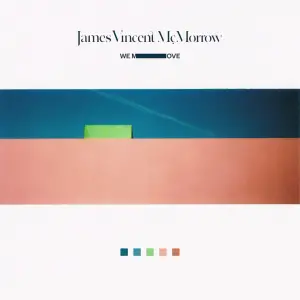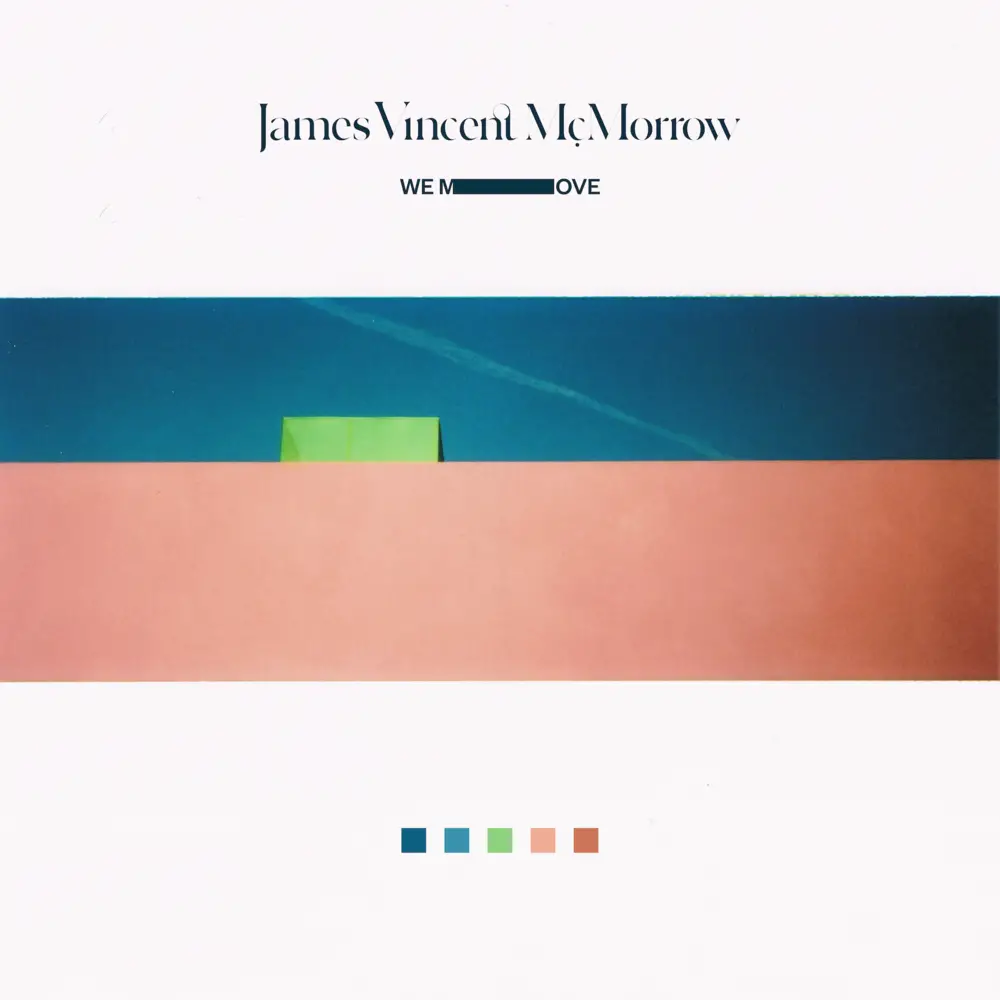“In every part of this new album I see myself. I hear it in every lyric and every note. And it’s still fucking terrifying. But it’s exactly what I needed to make. Because I can’t be the person I want to be, or the musician I want to be, unless I pursue what I hear without hesitation.”
This is one of the things James Vincent McMorrow said about We Move in a letter about his new album, posted on his website on July 5th, just under two months before the record’s September 2nd release (via Caroline).

We Move shows McMorrow like you’ve never seen, or heard, before. In a sonically and lyrically ambitious record, he re-discovers his sound and invites us into his life. Everything about We Move signifies change – from the fact that, for the first time, James Vincent McMorrow produced his record with other people, including Nineteen85 (Drake’s producer) and Two Inch Punch, to the literal recording of the album, which was done in Los Angeles, Toronto, and Dublin. It was the first time McMorrow did not record an album in a remote place.
In the aforementioned letter, McMorrow says that in this record he abandons the idea of clouding the real meaning of his lyrics in metaphors and imagery, and instead leaves it out in the open, explicit and honest. The title of the album itself literally means movement, progress, and change. It seems like We Move will be a turning point in James’ career, and it deserves to be so.
Here’s Atwood Magazine’s track-by-track review of We Move.
Listen: We Move – James Vincent McMorrow
[soundcloud url=”https://api.soundcloud.com/playlists/252674247″ params=”color=ff5500&auto_play=true&hide_related=false&show_comments=true&show_user=true&show_reposts=false” width=”100%” height=”450″ iframe=”true” /]
Watch: “Rising Water” – James Vincent McMorrow
[youtube=https://youtu.be/G3pmbuZYF2Y?t=0s]Rising Water
“Rising Water” is the perfect opener to an album with this title. The lead single off the album opens up the doors to McMorrow’s world with a song whose heartbeat is almost as remarkable as the change in style that this song presents us with. In this pulsating tune, James Vincent McMorrow takes us on a journey, from his anticipation of playing the game of love to the sad realisation that his loved one does not want to join him, a change in sentiment that is reflected in the melody – which slows down when he realises he is alone on this quest. “Rising Water” exemplifies the ambition and boldness of We Move, for not only does it not sound like anything we’ve heard from McMorrow before (note the significant absence of a guitar and his memorable high notes) but it accurately reflects the sentiment of the album as a whole in a few words: change, honesty, fearlessness, energy, and dancing. To quote McMorrow himself: “There is no reason why dancing and real life need to be mutually exclusive things.”
It’s like a game where everybody dies and has no fun
Still I wanna play it, even if I end where I begun
[soundcloud url=”https://api.soundcloud.com/tracks/278028508″ params=”color=ff5500&auto_play=false&hide_related=false&show_comments=true&show_user=true&show_reposts=false” width=”100%” height=”166″ iframe=”true” /]
I Lie Awake Every Night
The album slows down on its second track, a soulful song about McMorrow’s struggles with eating disorders when he was a teenager. He promised to be transparent in his lyrics, and in “I Lie Awake Every Night,” he keeps his promise beautifully. The expression of his pain comes through in the chorus especially, where he says:
You’ll never learn how much I want to burn
You’ll never know how much I want to go
He describes the degree of his fragility in the lyrics:
Porcelain against the wall
What’s interesting about this track is the juxtaposition between such lyrics with a melody that, despite being much more mellow and slower than that of ‘Rising Water’, still does not connote pain or suffering. His lyrics cry for help, while the melody shows the listener a certain level of strength. He slows down, which is appropriate given the subject matter of the song, but does not ask to be pitied – this song is simply used as a medium to let his feelings out.
[soundcloud url=”https://api.soundcloud.com/tracks/278028554″ params=”color=ff5500&auto_play=false&hide_related=false&show_comments=true&show_user=true&show_reposts=false” width=”100%” height=”166″ iframe=”true” /]

Last Story
In an ode to his loved one, McMorrow delivers a track which manages to convey the bliss of being young and in love with lyrics that take us back to his teenage years like:
You turn it up
In your mothers basement
Trying to hold a cup
I was young
Maybe twice
I picked a fight
Just to be violent
This song is here to remind you that love is, indeed, a beautiful thing, especially when you’re young and full of hope. The feeling in the song escalates when the chorus comes in and there are added layers to his voice, creating an atmosphere which strongly resembles that of a wedding in a church. The whole song is cinematic, telling a story from the very first verse and ending at its most joyful moment – it could easily be the theme song of a Hollywood movie about a couple who’s young and in love and, despite facing difficulties in their path, end up getting married and living happily ever after. It’s difficult to find a good song about happy moments in one’s life, but this one qualifies.
[soundcloud url=”https://api.soundcloud.com/tracks/278028339″ params=”color=ff5500&auto_play=false&hide_related=false&show_comments=true&show_user=true&show_reposts=false” width=”100%” height=”166″ iframe=”true” /]
One Thousand Times
When I first heard this song, it’s beginning instantly made me think I was listening to Whitney Houston. This is just a mere indication of how much James Vincent McMorrow is challenging himself and changing his sound with this album – if you disagree listen to ‘If I Had a Boat’ from his debut album ‘Early in the Morning’, then come back and listen to ‘One Thousand Times’ – his evolution as an artist is evident. “One Thousand Times” tells the story of a past relationship which wasn’t exactly healthy for either party involved, but which McMorrow desires to have back nonetheless. The desire he explores in this song isn’t necessarily derived from love or lust, but just from convenience or wanting the comfort of being in a relationship – he continually hints at the idea of him and his loved one having taken the relationship for granted and this feeling is the driving force behind his wish of wanting to be in it again. People being in a relationship for the comfort of it, without necessarily being crazy in love with each other, isn’t rare at all, but is something very few are open about. McMorrow tackles this side of the human experience, which isn’t necessarily pretty since it stems from self-interest, without fear of actually admitting to being flawed, again keeping his promise of being more honest than ever in this album.
I don’t want to live without your love
I had let it go to waste
But I don’t want to live without your love
Funny how we do without
Everything we trade away
Only in November when it’s cold
Do we miss the warmth of
Every wound ever opened
Every man to ever see you
You should take advantage of the summer
Cause if you’re alone
If you’re alone
How can I save you
Or find a way to make your life
More complicated
[soundcloud url=”https://api.soundcloud.com/tracks/278028403″ params=”color=ff5500&auto_play=false&hide_related=false&show_comments=true&show_user=true&show_reposts=false” width=”100%” height=”166″ iframe=”true” /]
Evil
If you want to be intrigued, look no further, “Evil” is the song for you. It’s hook, which is what kicks off the song, is probably my favourite piece of music from the entire album: it’s different from anything you’ll hear in We Move, there is a certain level of mystery and anticipation, and it’s addictive to listen to. It will catch you instantly. The song itself is about being in a relationship which causes you to look at yourself differently – when you decide to believe that the other person’s negative perception of you is the truth, and diminish yourself in the process.
You said it best
That it’s a long hard trek
I’m a mess
Still better than a wreck
This used to work for me
Now I can barely even stand
How I feel about myself
How this is nothing like we planned
“Evil” also shows us that McMorrow is tired of being treated this way, and is being open about it. He also touches upon his hubris, and how this relationship not fitting him “like a man”:
Are you good?
Because I don’t feel right
Are you strong?
Because I’m so damn tired
What you want from me?
Maybe you already have it
Will we ever reach the point
Where this fits me like a man?
The song goes through a tremendous build-up after the second chorus, with several layers of voices, percussion, and melody, being played at the same time – maybe symbolising McMorrow’s emotional buildup in this tormented relationship. The hook comes back intensely and McMorrow just repeats “If I’m evil…”, adding suspense to the song, which then ends with a cliffhanger – the hook fades out and you don’t know what he has decided to do. It’s a song that begs for another chapter.
Watch: “Get Low” (live session) – James Vincent McMorrow
[youtube=https://youtu.be/Z8-a9cMMloI?t=0s]Get Low
The second single off the album, “Get Low” deals with the dynamics of living in LA – or at least the dynamics of McMorrow’s life there for a few months last year. He has said the song is about living in LA but not knowing how to. The guitar, which coupled with his high notes was McMorrow’s trademark up until We Move, finally takes centre stage in the album. This song provides us with an introvert’s perspective of a city where everyone is trying to achieve something stratospheric, where you’re either really well-known or not known at all, and where the business which keeps it going leads you to mistrust those around you. He shines a light on the realities of the industry, navigating around people being fake and unwilling to help when you need it, and the feeling of uncertainty which seems to be pervasive in that environment.
How’d we get invited (get low)
Out here in LA (get low)
Trying to be the man you need (get low)
Everyday (oh you’re never sure, now you’re never sure)
Thought I’d write a novel (get low)
Didn’t like the weight (get low)
It’s hard to stay inspired (get low)
Stay awake (oh you’re never sure, now you’re never sure)
Constantly in darkness it works
It can get you so far
But digging in the dirt, it gets cold
Then you’re left with no one
McMorrow sings to a person who embodies LA and the music industry and also symbolises the transformation people go through after moving there (“loving what your heart becomes”, “even when you smile, you’re still cruel”). It’s a different take on a world that is so frequently romanticised and which McMorrow is surrounded by but not directly a part of, which gives him an interesting perspective to write this song from.
[soundcloud url=”https://api.soundcloud.com/tracks/278028349″ params=”color=ff5500&auto_play=false&hide_related=false&show_comments=true&show_user=true&show_reposts=false” width=”100%” height=”166″ iframe=”true” /]
Killer Whales
“Killer Whales,” which was not a single before the album but was streamed on McMorrow’s Facebook page a few weeks prior to the album’s release, is a song which explores self-doubt in its purest form. Just like in ‘I Lie Awake Every Night’, McMorrow is showing us his inner feelings without asking for pity or help – the song is probably a catharsis which hopefully will get him to understand how he feels about himself. In the letter he published months before releasing the album, James Vincent McMorrow talked about not being the most confident person, and it’s this sentiment he is evoking in ‘Killer Whales’, where he investigates his feelings of self-doubt in different areas of his life: ranging from being in a relationship to being remembered in the world. He is again offering us a glimpse of his true self, and it’s in these songs where you see the real effort he put into making this album – it takes a lot for someone to bare it all for a friend, imagine being this open for the whole world to hear. It isn’t easy, but it’s worth it, because in songs like “Killer Whales” and “I Lie Awake Every Night” you really feel the emotional connection to the album, which is what essentially makes it so special for both McMorrow and the listener.
[soundcloud url=”https://api.soundcloud.com/tracks/278028468″ params=”color=ff5500&auto_play=false&hide_related=false&show_comments=true&show_user=true&show_reposts=false” width=”100%” height=”166″ iframe=”true” /]

Seek Another
If you’re a fan of James Vincent McMorrow’s voice, you will love “Seek Another.” In this pretty simple song, a constant beat and chord sequence repeat themselves while the versatility in McMorrow’s voice is showcased. He starts the song with the high notes we all know and love him for, but descends almost to the point of speaking after the second chorus. Here there is no choir like in ‘Last Story’ or backup singers like in ‘Get Low’, but he provides his own backup voice. He suggests that the person he is singing to should protect his or herself (“Don’t go out alone/I have seen some terrible things”) and yet does not protect his voice in this track, but instead shows you various sides of it. This is symbolic of McMorrow’s growing self-confidence, since in We Move he decided to allow his voice to be at the forefront of the record instead of camouflaging it like I mentioned before.
[soundcloud url=”https://api.soundcloud.com/tracks/278028487″ params=”color=ff5500&auto_play=false&hide_related=false&show_comments=true&show_user=true&show_reposts=false” width=”100%” height=”166″ iframe=”true” /]
Surreal
In the album’s first ballad, McMorrow talks about reaching the point in a relationship where the games end and it turns into something serious, where you either give in or your relationship won’t progress. “Surreal” is the tug of war between wanting to be vulnerable and being afraid to be so open, which might also reflect McMorrow’s sense of anticipation but slight fear of being this honest in We Move. His voice, like in ‘Seek Another’, is the shining star of the track, making it even more personal – his high notes make it seem like you’re peeping into his soul, commanding you to listen but at the same time exposing both his vulnerability and strength.
[soundcloud url=”https://api.soundcloud.com/tracks/278028457″ params=”color=ff5500&auto_play=false&hide_related=false&show_comments=true&show_user=true&show_reposts=false” width=”100%” height=”166″ iframe=”true” /]
Lost Angles
I believe “Lost Angles” is the anthem of We Move. The song encapsulates McMorrow’s struggle with and desire to change, accurately translating both his fear and braveness in putting out such a bold record. McMorrow has continuously declared that We Move is the album he has always wanted to make, both in terms of sound and lyrics, and the main message of ‘Lost Angles’ is, basically, don’t be afraid of owning up to who you are – “don’t let fear control you”. He nods to the album’s title in the song, saying “There’s a reason that people move or people don’t, people change or people stay the same completely” and in these lyrics is referencing his own movement and change as well as other people’s. Again, his voice is the song’s main character and this increases your proximity to the track. In ‘Lost Angles’, McMorrow talks to you, but mainly talks to himself, encouraging himself to take risks. This song closes the record, leaving a legacy of bravery and sentimentality behind, and reminding you that, indeed, we are all humans, plagued by insecurities and fear but moved by desire and willpower – we’re all moving across the same ocean, but only on different boats.
What you want to be
This time
You could be a wolf one day
Just howling away
Is it better
To live your life in shallow water
Or risk failure
Drowning in the deep end
So you fear it
You fear that every move you make
Is just a hammer
you are just a nail but you’re not
Don’t let fear control you
—
Connect with James Vincent McMorrow on Facebook, Twitter, Instagram
Discover more new music on Atwood’s Picks
cover photo: James Vincent McMorrow © Sarah Doyle
We Move – James Vincent McMorrow
:: James Vincent McMorrow :: Tour 2016 ::
11/7 – Webster Hall – New York, NY
11/9 – 9:30 Club – Washington D.C.
11/10 – Union Transfer – Philadelphia, PA
11/11 – Paradise Rock Club – Boston, MA
11/12 – Corona Theatre – Montreal, QC, CAN
11/14 – Phoenix Concert Theatre – Toronto, ON, Canada
11/15 – Newport Music Hall – Columbus, OH
11/16 – Metro – Chicago, IL
11/18 – First Avenue – Minneapolis, MN
11/19 – Park Theatre – Winnipeg, Manitoba, CAN
11/21 – The Winspear Centre – Edmonton, Alberta, CAN
11/22 – Jack Singer Concert Hall – Calgary, Alberta, CAN
11/24 – Commodore Ballroom – Vancouver, British Columbia, CAN
11/25 – Alix Goolden Hall – Victoria, British Columbia, CAN
11/26 – The Showbox at The Market – Seattle, WA
11/27 – Wonder Ballroom – Portland, OR
11/29 – The UC Theatre – Berkeley, CA
12/1 – The Wiltern – Los Angeles, CA










